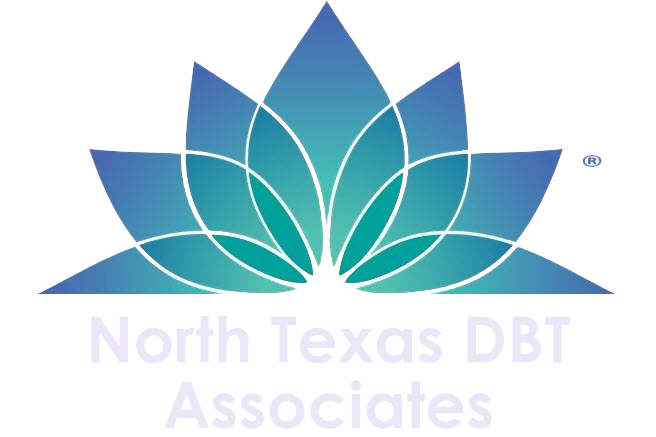North Texas DBT Associates offers therapeutic services to individuals, couples and families. Our clinicians are trained in providing treatment to adolescents and adults. We also offer parent trainings to help restore balance in the families we treat.
Types of Therapy
- Comprehensive DBT
- Comprehensive DBT for Adolescents
- DBT for Children
- DBT Prolonged Exposure Protocol for PTSD
- Cognitive Behavioral Therapy
- CBT for Insomnia
- Brainspotting
Services for Mental Health Providers
What is DBT?
Dialectical Behavior Therapy is an evidence-based treatment that emphasizes individual psychotherapy and group skills classes to help people learn new strategies to develop a life that they experience as worth living. DBT skills include mindfulness, emotion regulation, distress tolerance and interpersonal effectiveness. Comprehensive DBT services are effective in treating a wide range of issues such as personality disorders, treatment-resistant depression and anxiety, suicidal ideation and suicide behaviors, nonsuicidal self-injury, posttraumatic stress disorder (PTSD), substance use disorders, disordered eating, obsessive compulsive disorder (OCD), attention deficit hyperactivity disorder (ADHD), bipolar disorder and severe emotion dysregulation. DBT has been shown to be more effective than hospitalization in the treatment of suicidality.
Want to learn more about DBT? Click through the button below for a great video from Dr. Esme Shaller of UC San Francisco.
Comprehensive DBT
North Texas DBT Associates is one of the only practices in the Dallas-Ft. Worth metroplex that offers true comprehensive DBT services. Our clients receive structured weekly individual therapy, attend weekly group skills classes, have 24/7 access to phone coaching, and are treated by clinicians who are on a DBT consult team. Whoever you work with, the four aforementioned components must be included or it is not true DBT. Our staff are all trained through Marsha Linehan’s training institute, Behavioral Tech.
DBT for Adolescents
Comprehensive DBT for Adolescents treats the same issues as standard DBT but is targeted at teens aged 13-18. In DBT for Adolescents, teens attend structured weekly individual sessions, the teen and at least one parent attend weekly group skills classes, both teen and parent have access to 24/7 phone coaching support and are each assigned their own therapist/coach who is currently on a DBT consult team.
DBT for Children
DBT C is DBT that has been adapted to address the developmental levels of children ages 7-12. The main goals of this evidence-based treatment are to teach children adaptive coping skills so that they can handle strong emotions, and to involve their parents and primary caregivers in order to create an environment that will support new, more effective behaviors. DBT C consists of either one 90-minute session or two 45-minute sessions each week.
DBT Prolonged Exposure Protocol for PTSD
DBT Prolonged Exposure Protocol was designed by Melanie Harned, PhD, ABPP, to treat clients with PTSD and co-morbid behaviors associated with personality disorders, dissociative disorders, substance use disorders, eating disorders, and mood disorders. Based on traditional Prolonged Exposure therapy, it has been tailored to treat multi-problem clients who might otherwise not be candidates for PTSD treatments due to the severity of symptoms. Treating PTSD in these clients has been shown to effectively decrease lifetime risk for suicide, self-injury and anxiety, and assists clients in their goal of creating a life worth living.
For more information, visit the DBT PE website here: dbtpe.org
Cognitive Behavioral Therapy
CBT is a present-focused, goal-oriented and evidence-based treatment that aims to alter negative cognitive processes and ineffective behaviors which serve to perpetuate ongoing life challenges. This assists clients in finding greater balance, improved mood and better overall functioning.
CBT for Insomnia
CBT-I is a treatment for chronic insomnia that has been empirically shown to be more effective and less dangerous than sleeping pills. Over the course of 5 sessions, clients are taught cognitive restructuring techniques to challenge negative sleep thoughts that contribute to insomnia so they can finally get some rest! CBT for Insomnia is currently only offered as adjunctive treatment to clients in the Comprehensive DBT program.
Brainspotting
“Where you look affects how you feel” Created by David Grand, PhD. In 2003, Brainspotting (BSP) centers around how brain activity is affected by eye position. Unprocessed trauma in the brain can be directly linked to relevant points in a person’s eye position and accessing this trauma through Brainspotting has proven effective for a variety of emotional and somatic conditions. BSP can help a client and their therapists to find the source of problems and has many applications such as improving creativity and performance or developing natural resources and resilience. Brainspotting is a flexible tool which can be utilized in combination into many therapeutic modalities.
For more information, please visit: https://brainspotting.com/
Services for Therapists and Other Mental Health Providers
DBT Consultation
For those seeking DBT certification, those who are training in DBT, or those looking to increase fidelity to the DBT model at their practice, Courtney Hicks, a DBT-Linehan Board of Certification, Certified Clinician, provides DBT Consultation.
Our staff are all trained through Marsha Linehan’s institute, Behavioral Tech.
The following link provides access to DBT research done through peer-reviewed, randomized control trials available on Behavioral Tech’s website: Peer-Reviewed & Published Randomized Controlled/Comparative Trials

